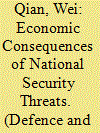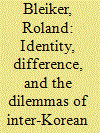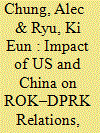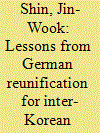|
|
|
Sort Order |
|
|
|
Items / Page
|
|
|
|
|
|
|
| Srl | Item |
| 1 |
ID:
072989


|
|
|
|
|
| Publication |
2006.
|
| Summary/Abstract |
This paper sheds light on aspects of functionalism and neo-functionalism in the Sunshine Policy and evaluates its contribution to inter-Korean relations through statistical analyses. On the whole, the policy could increase the trade volume and diversify trade structures encompassing primary and secondary industries, as well as processing-on-commission-based trade in economic sectors. Our research results demonstrate that the policy has contributed to the progress of inter-Korean relations in socio-economic areas. Notwithstanding the increasing economic gap between the North and South, inter-Korean trade has expanded in the context of the economic urgency of the North and the mutual benefits of inter-Korean cooperation. In social sectors, the Kim Dae Jung government in comparison to previous governments encouraged personal exchanges, and these personal contacts should enhance mutual understanding between the North and South Korean people. In political and military sectors, the Sunshine Policy has been less positive in the current military build-up by both Koreas. Since the security issue of the two Koreas is the most vital factor for survival, broad and long-term perspectives based on mutual reliance and trust are needed.
|
|
|
|
|
|
|
|
|
|
|
|
|
|
|
|
| 2 |
ID:
192058


|
|
|
|
|
| Summary/Abstract |
This paper examines the impact of national security threats on a nation’s economic growth and fiscal policy based on a case study of the Korean peninsula. I construct four measures of provocations using a newly-assembled list of North Korean provocative events going back to 1960. The results show that the overall impact of North Korean provocations on South Korea’s short-run economic growth is negligible. Since inter-Korean relations have gone through four phases, this paper also estimates the impact of provocations over each subperiod. Provocations had a significant impact on South Korea’s economic growth during 1960-1970 and 1992-1997 when inter-Korean tensions were high, but the effects took on different signs. While provocations decreased South Korea’s economic growth during 1992-1997, it had a positive impact on South Korea’s macroeconomy before 1970. This paper provides evidence that the effect of national security threats may vary with the responses from the government and political factors such as the relation between the targeted country and the country that inflicts the threat.
|
|
|
|
|
|
|
|
|
|
|
|
|
|
|
|
| 3 |
ID:
053925


|
|
|
| 4 |
ID:
185893


|
|
|
|
|
| Summary/Abstract |
The relationship between the ROK and DPRK is bound to be affected by the two great powers—the US and China. Especially in recent decades, the power gap between the two great powers has continued to narrow. Given this, how is the geopolitical situation surrounding the Korean Peninsula shaping inter-Korean relations? This study uses event data and statistical analysis to explore the geopolitical factors that shaped inter-Korean relations from 1993 to 2019. We find that DPRK–ROK relations deteriorated as the power gap between the US and China narrowed. Also, inter-Korean relations were positive when DPRK–US relations were positive. In short, we conclude that during the shift in the US–China power distribution, maintaining positive DPRK–US relations while also managing inter-Korean relations peacefully is necessary for peace on the Korean Peninsula.
|
|
|
|
|
|
|
|
|
|
|
|
|
|
|
|
| 5 |
ID:
160764


|
|
|
|
|
| Summary/Abstract |
Relation is a meandrous concept. It neither maintains any static conditions nor it provides any static nature. It changes with the change of time and space. Today’s friend may be tomorrow’s foe or vice-versa. This paper tries to lay bare historically the two sovereign Korean countries’ political, economic, military and security aspects, as well as the strained Inter-Korean relations, question of re-unification, and new aspiration of unification, which was once a unified nation, under one flag with single political entity, sharing common culture, history, norms, ethnicity, and language.
|
|
|
|
|
|
|
|
|
|
|
|
|
|
|
|
| 6 |
ID:
128741


|
|
|
|
|
| Publication |
2014.
|
| Summary/Abstract |
In this article I present competing patterns of discursive reconstruction of German reunification in South Korean public spheres and the methods of mobilizing them for domestic debates on inter-Korean relations. I analyze the editorials and opinion articles of two newspapers, Chosun Daily and Hankyoreh, which respectively represent the most influential conservative and progressive print media in South Korea. The articles not only discuss German reunification in contrasting ways but also integrate those interpretive schemes into policy advocacy on North Korea. The conservatives utilized the narratives about the breakdown of the East German regime and the subsequent unification to justify an aggressive policy toward North Korea, whereas progressives consistently judged the German case as "unification by absorption," giving full support to reconciliation and peaceful coexistence.
|
|
|
|
|
|
|
|
|
|
|
|
|
|
|
|
| 7 |
ID:
086685


|
|
|
|
|
| Publication |
2009.
|
| Summary/Abstract |
The launching of the Lee Myung-bak (known as "MB") government in February 2008, coupled with the landslide victory by the ruling Grand National Party in the April 9 general election, opened a new era of conservative dominance while ending a decade of progressive rule. But the triumphant mood did not last long, as the MB government encountered a series of political, economic, and social crises as well as setbacks in its foreign and inter-Korean relations.
|
|
|
|
|
|
|
|
|
|
|
|
|
|
|
|
| 8 |
ID:
144530


|
|
|
|
|
| Summary/Abstract |
South Korea aspires to a larger regional and global role, fuelled by economic success, and complemented by cultural and diplomatic achievement. However, a gap exists between the rhetoric and reality of its foreign policy. This paper examines Seoul's middle-power activism. It poses questions about the conceptual deficit of ‘middle power’, proffering an operational definition in illuminating the characteristic identity formation of middle powers. It analyses how the Roh Moo-hyun and Lee Myung-bak governments sought to articulate their respective middle-power foreign policy aspirations. Finally, it investigates how domestic political and institutional conditions shape Republic of Korea foreign policy, and identifies policy implications.
|
|
|
|
|
|
|
|
|
|
|
|
|
|
|
|
|
|
|
|
|